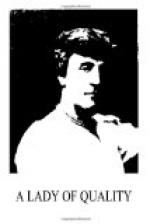She tried to raise her, but the child would not be raised, and clung to her rich robe, shaking as she knelt gazing upward.
“It is a bitter thing,” my lady said, and ’twas as if her own eyes were imploring. “God help you bear it—God help us all. He told me nothing of his journey. I knew not he was about to take it; but wheresoever he has travelled, ’twas best that he should go.”
“Nay! nay!” the girl cried out—“to leave me helpless. Nay! it could not be so. He loved me—loved me—as the great duke loves you!”
“He meant you evil,” said my lady, shuddering, “and evil he would have done you. He was a villain—a villain who meant to trick you. Had God struck him dead that day, ’twould have been mercy to you. I knew him well.”
The young thing gave a bitter cry and fell swooning at her feet; and down upon her knees my lady went beside her, loosening her gown, and chafing her poor hands as though they two had been of sister blood.
“Call for hartshorn, Anne, and for water,” she said; “she will come out of her swooning, poor child, and if she is cared for kindly in time her pain will pass away. God be thanked she knows no pain that cannot pass! I will protect her—ay, that will I, as I will protect all he hath done wrong to and deserted.”
* * * * *
She was so strangely kind through the poor victim’s swoons and weeping that the very menials who were called to aid her went back to their hall wondering in their talk of the noble grandness of so great a lady, who on the very brink of her own joy could stoop to protect and comfort a creature so far beneath her, that to most ladies her sorrow and desertion would have been things which were too trivial to count; for ’twas guessed, and talked over with great freedom and much shrewdness, that this was a country victim of Sir John Oxon’s, and he having deserted his creditors, was read enough to desert his rustic beauty, finding her heavy on his hands.
Below stairs the men closing the entrance to the passage with brick, having caught snatches of the servants’ gossip, talked of what they heard among themselves as they did their work.
“Ay, a noble lady indeed,” they said. “For ’tis not a woman’s way to be kindly with the cast-off fancy of a man, even when she does not want him herself. He was her own worshipper for many a day, Sir John; and before she took the old earl ’twas said that for a space people believed she loved him. She was but fifteen and a high mettled beauty; and he as handsome as she, and had a blue eye that would melt any woman—but at sixteen he was a town rake, and such tricks as this one he hath played since he was a lad. ’Tis well indeed for this poor thing her ladyship hath seen her. She hath promised to protect her, and sends her down to Dunstanwolde with her mother this very week. Would all fine ladies were of her kind. To hear such things of her puts a man in the humour to do her work well.”




